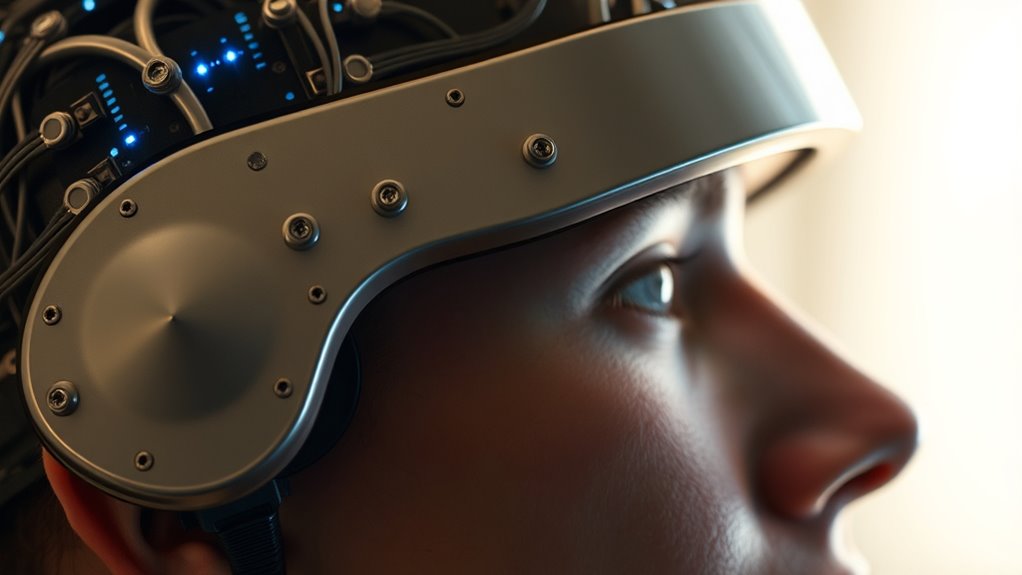Brain-Computer Interfaces (BCIs) are advancing fast, promising tools that can link your mind directly to external devices. These systems could soon enable you to control machines, enhance your cognitive abilities, or recover lost functions after injury—all with minimal invasiveness. While exciting, they also raise ethical concerns about privacy and security. As this technology develops, you’ll discover how it might reshape human interaction and what challenges lie ahead. Keep exploring to see what’s possible next.
Key Takeaways
- BCIs enable direct neural communication with external devices, paving the way for advanced mind control applications.
- Technological progress aims for less invasive, wearable BCIs to improve accessibility and reduce surgical risks.
- Ethical concerns include privacy, cognitive manipulation, data ownership, and potential misuse of neural information.
- Applications include neural enhancement, restoring lost functions, and controlling devices through brain signals.
- Future development requires balancing innovation with ethical oversight to prevent inequality and ensure safe, equitable use.

Have you ever wondered how technology can directly connect your brain to computers? This exciting possibility is becoming more real with advancements in brain-computer interfaces, or BCIs. These devices enable direct communication between your neural activity and external systems, opening doors to neural enhancement, where your brain’s capabilities could be boosted beyond natural limits. Imagine being able to learn new skills instantly or recover lost functions after injury, all through seamless brain-machine integration. But as with any breakthrough, it’s crucial to consider the ethical considerations involved. Questions about privacy, consent, and the potential for misuse are critical as we move forward. You might think about how these interfaces could be used responsibly to improve lives without infringing on personal autonomy. The development of BCIs involves decoding neural signals, translating them into commands that computers can understand, and vice versa. This process requires sophisticated sensors and algorithms that can interpret complex brain activity in real time. As these systems become more refined, they’ll likely become less invasive, possibly allowing you to wear a lightweight device rather than undergo surgery. The promise of neural enhancement through BCIs isn’t just about augmenting your abilities but also restoring lost functions, such as helping stroke victims regain movement or providing communication options for those with paralysis. However, the ethical considerations are just as significant as the technological ones. Concerns about data security are paramount—your brain data could reveal deeply personal thoughts or emotions if not properly protected. There’s also the risk of cognitive manipulation or hacking, which raises questions about your mental privacy and autonomy. Society must grapple with who owns the data generated by brain activity and how it can be used. Moreover, the potential for social inequality exists if such enhancements become accessible only to the wealthy, creating a divide between those with superior cognitive abilities and those without. As you contemplate these developments, it’s critical to advocate for regulations that ensure safety, privacy, and fairness. While the idea of controlling devices or even thoughts with your mind might seem like science fiction today, it’s rapidly approaching reality. With responsible innovation and careful ethical oversight, brain-computer interfaces could revolutionize medicine, communication, and human ability. But remember, the journey toward this future isn’t just about technological progress—it’s about shaping a world where these powerful tools serve humanity ethically and equitably. Additionally, ongoing research emphasizes the importance of addressing AI security vulnerabilities to prevent potential malicious exploits that could compromise user safety.
Frequently Asked Questions
How Secure Are Brain-Computer Interfaces From Hacking?
Brain-computer interfaces aren’t fully secure from hacking vulnerabilities yet. While neural encryption helps protect your thoughts, hackers could exploit weaknesses in the system. You should stay informed about updates and security measures, as researchers work to strengthen defenses. Using strong encryption protocols and regular system checks can reduce risks, but no system is completely invulnerable. Always be cautious with sensitive data connected to brain-computer interfaces.
Can BCI Technology Be Used for Entertainment Purposes?
Yes, BCI technology can be used for entertainment purposes. You might experience neural enhancement that allows you to immerse yourself in virtual reality worlds more deeply, creating a more realistic and engaging experience. As BCI develops, it could enable you to control games or virtual environments directly with your brain, making entertainment more interactive and personalized. This tech offers exciting possibilities for immersive gaming, virtual concerts, and other innovative entertainment forms.
What Are the Long-Term Health Effects of BCI Use?
You might experience changes in neural plasticity with long-term BCI use, which could alter how your brain adapts and rewires itself. There’s also a psychological impact to take into account, like stress or dependency issues. While research is ongoing, you should stay informed about potential risks and consult professionals if you notice lasting effects. Long-term health effects remain uncertain, so caution and careful monitoring are essential.
How Affordable Will BCI Devices Become for Consumers?
You’ll likely see BCI devices become more affordable as cost reduction efforts accelerate; experts predict prices could drop by up to 80% within the next decade. This trend will boost market accessibility, making the technology available to a broader audience. As production scales up and innovation continues, you’ll find BCI devices more budget-friendly, possibly comparable to current high-end smartphones, opening new possibilities for everyday use and personal enhancement.
Are There Ethical Concerns Surrounding Mind Data Privacy?
You should be aware that there are significant ethical concerns about mind data privacy. Privacy risks include sensitive information being accessed without your consent, and consent challenges arise because understanding how your data is used can be complicated. It’s essential to stay informed and advocate for strong regulations to protect your mental privacy, ensuring that your thoughts and intentions remain secure and that you retain control over your personal mind data.
Conclusion
As you stand on the cusp of this new frontier, brain-computer interfaces are like keys revealing the boundless universe within your mind. With each breakthrough, you’re not just controlling devices—you’re weaving your thoughts into the fabric of reality. The horizon isn’t just a distant line anymore; it’s a gateway where your intentions become the architects of tomorrow’s world. Embrace this revolution, and watch your mind’s melody shape the symphony of the future.









